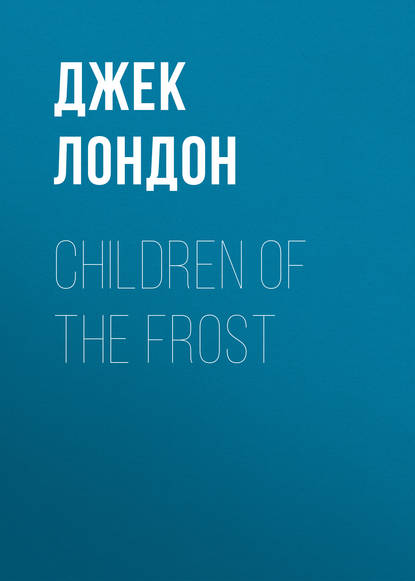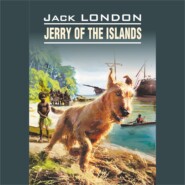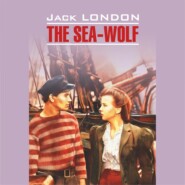По всем вопросам обращайтесь на: info@litportal.ru
(©) 2003-2024.
✖
Children of the Frost
Настройки чтения
Размер шрифта
Высота строк
Поля
"It is so," Nam-Bok persisted. "The steamer is all iron and does not sink."
"Nay, nay; this cannot be."
"With my own eyes I saw it."
"It is not in the nature of things."
"But tell me, Nam-Bok," Koogah interrupted, for fear the tale would go no farther, "tell me the manner of these men in finding their way across the sea when there is no land by which to steer."
"The sun points out the path."
"But how?"
"At midday the head man of the schooner takes a thing through which his eye looks at the sun, and then he makes the sun climb down out of the sky to the edge of the earth."
"Now this be evil medicine!" cried Opee-Kwan, aghast at the sacrilege. The men held up their hands in horror, and the women moaned. "This be evil medicine. It is not good to misdirect the great sun which drives away the night and gives us the seal, the salmon, and warm weather."
"What if it be evil medicine?" Nam-Bok demanded truculently. "I, too, have looked through the thing at the sun and made the sun climb down out of the sky."
Those who were nearest drew away from him hurriedly, and a woman covered the face of a child at her breast so that his eye might not fall upon it.
"But on the morning of the fourth day, O Nam-Bok," Koogah suggested; "on the morning of the fourth day when the sch – sch – schooner came after thee?"
"I had little strength left in me and could not run away. So I was taken on board and water was poured down my throat and good food given me. Twice, my brothers, you have seen a white man. These men were all white and as many as have I fingers and toes. And when I saw they were full of kindness, I took heart, and I resolved to bring away with me report of all that I saw. And they taught me the work they did, and gave me good food and a place to sleep.
"And day after day we went over the sea, and each day the head man drew the sun down out of the sky and made it tell where we were. And when the waves were kind, we hunted the fur seal and I marvelled much, for always did they fling the meat and the fat away and save only the skin."
Opee-Kwan's mouth was twitching violently, and he was about to make denunciation of such waste when Koogah kicked him to be still.
"After a weary time, when the sun was gone and the bite of the frost come into the air, the head man pointed the nose of the schooner south. South and east we travelled for days upon days, with never the land in sight, and we were near to the village from which hailed the men – "
"How did they know they were near?" Opee-Kwan, unable to contain himself longer, demanded. "There was no land to see."
Nam-Bok glowered on him wrathfully. "Did I not say the head man brought the sun down out of the sky?"
Koogah interposed, and Nam-Bok went on.
"As I say, when we were near to that village a great storm blew up, and in the night we were helpless and knew not where we were – "
"Thou hast just said the head man knew – "
"Oh, peace, Opee-Kwan! Thou art a fool and cannot understand. As I say, we were helpless in the night, when I heard, above the roar of the storm, the sound of the sea on the beach. And next we struck with a mighty crash and I was in the water, swimming. It was a rock-bound coast, with one patch of beach in many miles, and the law was that I should dig my hands into the sand and draw myself clear of the surf. The other men must have pounded against the rocks, for none of them came ashore but the head man, and him I knew only by the ring on his finger.
"When day came, there being nothing of the schooner, I turned my face to the land and journeyed into it that I might get food and look upon the faces of the people. And when I came to a house I was taken in and given to eat, for I had learned their speech, and the white men are ever kindly. And it was a house bigger than all the houses built by us and our fathers before us."
"It was a mighty house," Koogah said, masking his unbelief with wonder.
"And many trees went into the making of such a house," Opee-Kwan added, taking the cue.
"That is nothing." Nam-Bok shrugged his shoulders in belittling fashion. "As our houses are to that house, so that house was to the houses I was yet to see."
"And they are not big men?"
"Nay; mere men like you and me," Nam-Bok answered. "I had cut a stick that I might walk in comfort, and remembering that I was to bring report to you, my brothers, I cut a notch in the stick for each person who lived in that house. And I stayed there many days, and worked, for which they gave me money– a thing of which you know nothing, but which is very good.
"And one day I departed from that place to go farther into the land. And as I walked I met many people, and I cut smaller notches in the stick, that there might be room for all. Then I came upon a strange thing. On the ground before me was a bar of iron, as big in thickness as my arm, and a long step away was another bar of iron – "
"Then wert thou a rich man," Opee-Kwan asserted; "for iron be worth more than anything else in the world. It would have made many knives."
"Nay, it was not mine."
"It was a find, and a find be lawful."
"Not so; the white men had placed it there And further, these bars were so long that no man could carry them away – so long that as far as I could see there was no end to them."
"Nam-Bok, that is very much iron," Opee-Kwan cautioned.
"Ay, it was hard to believe with my own eyes upon it; but I could not gainsay my eyes. And as I looked I heard…" He turned abruptly upon the head man. "Opee-Kwan, thou hast heard the sea-lion bellow in his anger. Make it plain in thy mind of as many sea-lions as there be waves to the sea, and make it plain that all these sea-lions be made into one sea-lion, and as that one sea-lion would bellow so bellowed the thing I heard."
The fisherfolk cried aloud in astonishment, and Opee-Kwan's jaw lowered and remained lowered.
"And in the distance I saw a monster like unto a thousand whales. It was one-eyed, and vomited smoke, and it snorted with exceeding loudness. I was afraid and ran with shaking legs along the path between the bars. But it came with the speed of the wind, this monster, and I leaped the iron bars with its breath hot on my face…"
Opee-Kwan gained control of his jaw again. "And – and then, O Nam-Bok?"
"Then it came by on the bars, and harmed me not; and when my legs could hold me up again it was gone from sight. And it is a very common thing in that country. Even the women and children are not afraid. Men make them to do work, these monsters."
"As we make our dogs do work?" Koogah asked, with sceptic twinkle in his eye.
"Ay, as we make our dogs do work."
"And how do they breed these – these things?" Opee-Kwan questioned.
"They breed not at all. Men fashion them cunningly of iron, and feed them with stone, and give them water to drink. The stone becomes fire, and the water becomes steam, and the steam of the water is the breath of their nostrils, and – "
"There, there, O Nam-Bok," Opee-Kwan interrupted. "Tell us of other wonders. We grow tired of this which we may not understand."
"You do not understand?" Nam-Bok asked despairingly.
"Nay, we do not understand," the men and women wailed back. "We cannot understand."
Nam-Bok thought of a combined harvester, and of the machines wherein visions of living men were to be seen, and of the machines from which came the voices of men, and he knew his people could never understand.
"Dare I say I rode this iron monster through the land?" he asked bitterly.
Opee-Kwan threw up his hands, palms outward, in open incredulity. "Say on; say anything. We listen."
"Then did I ride the iron monster, for which I gave money – "

















